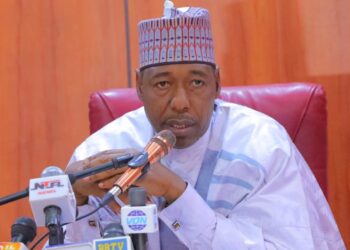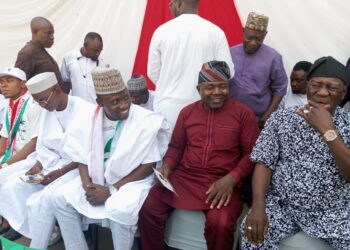Abuja – The Election Manipulation Risk Index (EMRI) says there are ongoing attempts to distort the outcomes of the coming general elections.
The organisation stated this in a report it released on Friday in Abuja.
The report was complied by the International Press Centre, Institute for Media and Society, Partners for Electoral Reform, The Albino Foundation, The Nigerian Women Trust Fund, The Kukah Centre, Enough is Enough Nigeria, Center for Journalism Innovation and Development, SBM Intelligence, Dataphye and Yiaga Africa.
Releasing the report, the group alleged that “attempts to distort election outcomes, using manipulation strategies are on the rise.
“Key actors are devising strategies to punctuate electoral preparations and neutralize the impact of laudable reforms aimed at enhancing the integrity of the electoral process.
“The political interference with INEC operations, tampering with the voter register, frivolous litigations and resistance against electoral technology like BVAS and IReV, and administrative lapses are electoral risks that may potentially impugn the integrity of the 2023 elections.”
According to the report, in response to these risks, civil society organisations designed the Election Manipulation Risk Index (EMRI) to facilitate systematic and coherent monitoring of the insidious nature of election manipulation in the build-up to Nigeria’s 2023 general elections.
“The central focus of the EMRI is election administration, and it seeks to provide citizens with a clear understanding of what constitutes election manipulation and the role of citizens in risk mitigation. It should be seen as a rapid scanning tool rather than an in-depth solution for threats of election manipulation,” it said.
The report added that “while other forms of manipulation can take place, the EMRI focuses on six variables for tracking election manipulation.
“They include; INEC capture, manipulation of the voter register, voter suppression, resistance to the election technology, especially BVAS and IReV, history of election manipulation, and election litigation.
“Several empirical indicators are then identified for each variable to unravel election manipulation.
“Election security may compound the analysis and shift the focus from the election administration process, hence its exclusion from the EMRI variables and indicators.”
The report classified 22 states as high-risk states due to the presence of more than three EMRI variables.
The states are Imo, Anambra, Enugu, Ebonyi, Abia, Rivers, Akwa Ibom, Lagos, Oyo, Osun, Ekiti, Kwara, Niger, Plateau, Taraba, Kaduna, Bauchi, Adamawa, Kano, Katsina, Sokoto and Jigawa.
Twelve states were classified as having medium election manipulation risks.
They states include Borno, Yobe, Nasarawa, Benue, Kogi, Zamfara, Kebbi, Ogun, Edo, Delta, Bayelsa and Cross River.
Three states were classified as low risk. They include Gombe, Ondo, and Federal Capital Territory.
According to the report, the EMRI is a qualitative tool of analysis that relies heavily on observation, content analysis, and expert interviews.
“Data collected through these methods are triangulated to reflect how they result in election manipulation, ” EMRI added.
The EMRI highlighted states where election manipulation occurred and introduced a ranking of states based on the prevalence of election manipulation indicators.
The risk indicator ranking is divided into three categories: High Risk (states with three variables and above), Medium Risk (states with two variables), and Low Risk (states with 1 or 0 variables).
The report claimed that most evidence for EMRI were sourced from INEC reports and statements and publications, pre- and post-election observation reports from domestic and international observers, and reports from trusted unbiased media institutions.
While reading the report, the Director of International Press Centre (IPC), Lanre Arogundade, promised that three EMRI iteration reports will be released on the 2023 general elections.
He noted that it is expected that the EMRI will curb election manipulation, facilitate strategic election planning and promote citizens’ oversight of the electoral process.
The report, however, advised that to mitigate against the risk, measures should be taken.
“INEC should deploy trusted, incorruptible, and experienced Administrative Secretaries, Heads of ICT, and Operations to high risks states; Intense scrutiny of applications for ad-hoc personnel recruitment; Applicants should undergo competency tests, and names of successful applicants should be published for public scrutiny; INEC should create a system for submitting objections against partisan and compromised ad-hoc officials.
” INEC should intensify oversight and monitoring of its officials in high and medium-risk states.
“This includes establishing a reporting mechanism that enables citizens to report concerns and complaints against INEC officials; clean-up of the voter register to remove multiple registrants, fictitious names, and underage registrants; greater transparency with the management of claims and objections submitted by citizens to INEC; diligent prosecution of INEC officials responsible for the manipulation of the voter register; enhanced monitoring and oversight of INEC officials managing the PVC collection process to prevent manipulation and deliberate denial from issuing PVCs to certain persons.
Also advised are timely production and distribution of PVCs to all registered voters, resistance to election technology like BVAS and IReV; enhanced security in storage facilities where the BVAS devices are stored; restraint on the part of the judiciary to entertain frivolous litigations against the use of the BVAS and IReV; continuous public sensitization on the capacity of the BVAS and IReV to limit election
manipulation; increase public awareness of mitigation measures in the 2022 Electoral Act against election manipulation, INEC should ensure adequate training of its staff to enforce compliance with the Electoral Act 2022 and INEC Regulations and Guidelines.
“Election litigation; the judiciary should dismiss cases instituted to undermine the preparations for the general elections; and the Nigerian Bar Association should take disciplinary actions against legal practitioners engaged in election manipulation using the judicial process,” the report advised.




















